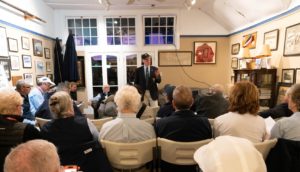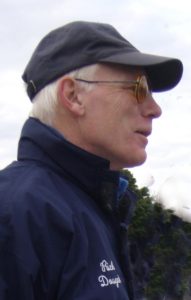 Good refereeing plays a vital role in the success of any regatta, not least the Head of the Schuylkill. Over the years, the HOSR has enjoyed the invaluable services of a large and faithful cadre of licensed referees.
Good refereeing plays a vital role in the success of any regatta, not least the Head of the Schuylkill. Over the years, the HOSR has enjoyed the invaluable services of a large and faithful cadre of licensed referees.
Equally important, however, the regatta has also consistently benefited from the contributions of several highly trained, talented, and seasoned individuals who, as Chief Referee, have taken on the complex task of organizing and supervising the race-day officiating. The most recent of these is Rich Dougert.
Rich gives an interesting account of how, in the late 1990’s, he first came to be involved in refereeing. In his own words,
“I was ‘shanghaied’ into officiating by [the late] Matt Ledwith and his colleague Kate Godwin. At the time I was a volunteer launch driver on the Schuylkill. A group of parents started a crew team for our daughters at Sacred Heart Academy in Bryn Mawr. We made a deal with Vesper for space, hired a coach, and eventually secured our own boats.
“The school rowed in the Philadelphia Scholastic Rowing Association (PSRA) events, which required parent volunteers to drive launches. I had some prior military experience driving launches, so it was natural for me to volunteer. It also gave me the opportunity to spend time at the river with my daughter, Betsy.
“Pretty soon I was a regular face at regattas and Kate and Matt took notice and suggested I should up my game and consider joining the referee corps. I passed my Assistant Referee exam in January 2001, and thus began this adventure in earnest.”
It takes time, though, and a lot of commitment, continual learning, and earned practical experience to climb the ranks. Rich passed his Full Referee exam and received his license from USRowing in January 2005. Attaining full referee status authorized him to assume the additional responsibilities of a Chief Referee.

Rich conducting the early morning referee meeting at the 2019 HOSR.
Asked about his guiding tenets as a referee of rowing, Rich responded “My philosophy is straightforward: I prioritize safety and fairness. I want every competitor and coach to know that, whether as a referee or chief, I will always act with the safety of the crews, volunteers, and other officials foremost in mind, and do my best to make sure crews have a level playing field, and that all rules are applied equally and consistently.
“My belief is that the Rules of Rowing should be applied consistently to all levels of rowers, from high school and scholastic on up to elite. At the novice level the crews will be learning and getting into a comfortable routine so that as they move up, they can expect that the application of rules will be totally consistent. In this way they will be able to concentrate on their rowing with minimal distractions.”
A measure of Rich’s commitment to the actual practice of refereeing is that in a normal COVID-free environment he would expect to work 20 to 25 full weekends – sometimes more – each year, in a season that runs from mid-March through mid-November. In the mix would be a range of local and regional scholastic and collegiate races such as the PSRA Flick-Horvat series and Championships; the Garden State Scholastic Championships; the Murphy and Kerr Cup Regattas; the Dad Vail, Stotesbury Cup and Independence Day Regattas; the USRowing National Championships; various fall head races including the Head of the Passaic, Head of the Charles, Head of the Christina, Navy Day and Head of the Schuylkill; and finally the Frostbite and Braxton Regattas. At various points, Rich would also expect to officiate up to five days of US National Team trials, typically held at Lake Mercer.
Rich readily admits that he could not begin to fulfill such a demanding schedule if he were not blessed with a very understanding and supportive family. But his annual refereeing schedule, while prodigious, falls well short of representing the full dimension of Rich’s dedication of service to the world of rowing. He is also – by both nature and official certification – a teacher, committed to the continuous recruitment and training of referees to meet the demands of a seemingly ever-expanding regatta calendar. Rich describes the evolution of his recruitment and teaching efforts as follows.
“As I progressed in experience and increased my skill level, I was tapped to be a Referee Clinician. This gave me an opportunity to teach at the annual mandatory USRowing referee clinics, instruct at the USRowing Referee College, and prompted me to establish a Regional Referee Academy (RRA) in the Mid-Atlantic region.
“I established the RRA with the support of our USRowing regional referee representative John Musial, the Schuylkill Navy, the PSRA, free use of boat house space, and a group of senior local referees who were willing to share their knowledge and time. We have added a good number of new referees who have taken advantage of the classroom and hands-on sessions. Graduates are given connections to local regattas, where experienced referees act as their mentors and are always there to provide guidance.
“Local training also extends to our on-the-water partners, launch drivers. Launch driver training clinics were born out of my frustration one season from refereeing the first four regattas with launch drivers who had never driven a boat. This necessitated on-the-job training throughout the day. Not the best situation, but with the cooperation of the Schuylkill Navy we have established an annual training course for volunteer launch drivers. An estimated 500+ eager volunteers have now taken the course, a bonus of which is that they are also then well prepped for taking the PA Boating Safety Course.”
Asked about his thoughts or concerns about the future of refereeing in the sport of rowing, Rich restates his firm belief that we do not have enough active, well trained, and experienced referees to meet the demand. Further, he points out that while other sports get by with a handful of officials for each event, major regattas, such as the HOSR, require as many as 25 referees or more to officiate effectively. And he asks that we consider that rowing referees carry out many more functions than just following races. For example, they manage on and off water traffic control, safety checks, starter and judge/alignment duties, timing team activity, and the occasional water rescue. All these functions are essential to providing a quality experience for the athletes and all require trained and experienced referees.
If you are interested in finding out more about how to become a rowing referee, a good place to start is on the USRowing web site at https://usrowing.org/sports/2019/9/30/referee-committee. From the contact information listed there, you will be able to find an appropriate representative for the area in which you live.
While Rich is without question the consummate rowing referee, what about Rich Dougert the private citizen, the husband, the father, the lover of the outdoors and of fly fishing and hiking? What is his personal story?

- While he was born in Shenandoah, Schuylkill County, PA, his parents raised him and his two brothers in Northeast Philadelphia, so he is really a “local guy.”
- His educational achievements include an AA degree in Liberal Arts from Peirce College, Philadelphia. He subsequently earned two degrees from St. Joseph’s University: a BA in Business Administration and Management; and an MBA in Marketing. And finally, he earned his Teaching Certificate from Delaware Valley University.
- Though now “mostly retired,” Rich was a consultant in Non-Profit Management and Strategic Planning.
- Rich and his wife Bobbie have lived in their home in Gulph Mills, PA for about 40 years, currently accompanied by their dog, Sammy. It is a pre-Revolutionary War home that was built in stages starting in 1735 and is situated on the road that George Washington used on his way to the Continental Army’s winter quarters at Valley Forge. Historic, indeed!
~ By Christopher Blackwall
We are celebrating the HOSR’s 50th anniversary by highlighting 50 legendary competitors/crews/teams/coaches/influencers that have catapulted the regatta into a fall classic over the last 50 years. We celebrate the people by passing down their stories through generations, and affecting change for the future of our sport. We will publish a new story each week, continuing the celebration of our 50th anniversary, leading up to the 2021 regatta.
